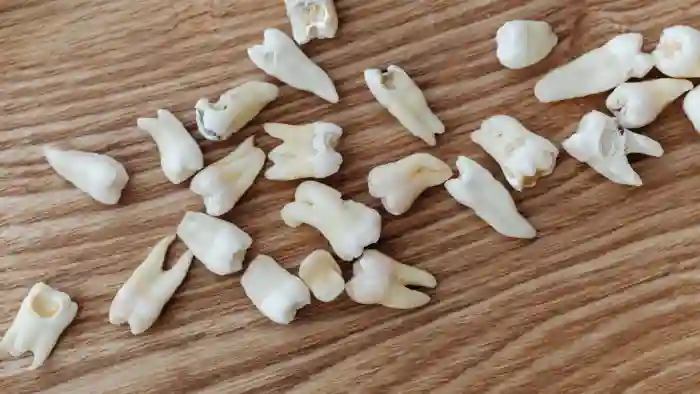Yes, broken teeth can cause various health problems if left untreated. The exposed tooth root and pulp can lead to infections and other dental health complications.
Broken teeth can have a significant impact on an individual’s overall health and well-being. Understanding the potential health risks associated with broken teeth is essential for taking appropriate measures to prevent further complications and maintain good oral health.
Types of Broken Teeth
Not all cracked teeth qualify as the same severity of “broken”. Three classifications of fractures exist based on the depth of penetration through the tooth layers:
Cracks
These defects penetrate only through tooth enamel, which is the thin, visible outside layer. Unless chunks detach, cracks pose no pain risk and require only cosmetic bonding repair if unsightly.
Fractures
Moderate splits continuing deeper into the thick dentin layer often cause mild pain from temperature changes or pressure as dentinal tubules get exposed. Root canal therapy plus crowns commonly treat painful minor fractures. However, if no symptoms appear, cautious monitoring may suffice initially.
Splits
These most severe fractures penetrate vertically through enamel, dentin, and into underlying pulp tissue. Expect pronounced pain and sensitivity with deep splits as the tooth’s nerve and blood supply become compromised requiring extraction or advanced endodontic procedures attempting salvage.
How Do Broken Teeth Affect Oral Health?

Broken teeth can significantly impact oral health, potentially leading to a range of issues if not addressed promptly.
Can broken teeth lead to gum issues?
Yes, broken teeth can create an environment where bacteria can thrive, leading to gum disease if proper dental care is not maintained. Additionally, untreated broken teeth may cause the affected tooth to weaken further and may eventually result in tooth loss.
What are the consequences of leaving a broken tooth untreated?
Without proper treatment, a broken tooth can develop complications such as nerve damage, which may necessitate a root canal procedure to salvage the affected tooth. Furthermore, leaving a broken tooth untreated can also result in the need for a dental implant or other extensive dental intervention to restore oral health.
Do fractured teeth affect the root canal?
Yes, a fractured tooth can lead to damage that affects the tooth’s pulp, potentially requiring a root canal to address the infection and preserve the natural tooth.
Short & Long Term Health Risks From Broken Teeth
Immediately after tooth fractures, common issues arise like:
- Tooth pain—from nerve irritation inside cracked dentin/pulp
- Temperature & pressure sensitivity—from exposed internal fluid passages
- Chips cutting tongue, lips or cheeks—from sharp enamel shards
But left chronically unattended for years, far more severe secondary complications accrue:
- Dental abscesses—from trapped bacteria decaying the inner pulp chamber
- Cysts/tumors—abnormal fluid swelling or growths often requiring extraction
- Bone infections—deep decays into surrounding maxillary bone
Once infections disseminate through connective tissues or enter the bloodstream, still worse systemic disorders follow including:
- Sepsis—life-threatening whole-body inflammation
- Cardiac infections—heart valve/muscle tissue damage
- Respiratory distress—lung inflammation and breathing difficulty
- Brain swelling—elevated intracranial pressure with migraines or neurological dysfunction
Clearly, disregarding especially moderate tooth fractures risks dangers extending far beyond just losing the affected tooth itself from decay spread or failed endodontic therapy.
What Happens if Broken Teeth Are Left Untreated?
Unresolved broken teeth can lead to a range of adverse consequences, impacting both oral health and overall well-being.
Can a broken tooth lead to an abscess?
Yes, a broken tooth can create conditions favorable for the development of an abscess, a painful collection of pus caused by a bacterial infection. This can lead to severe pain and swelling, and if left unattended, the infection can spread to other parts of the body, posing a serious health risk.
How does damage to a tooth affect overall health?
Damage to a tooth can result in persistent discomfort, difficulty in speaking and eating, and an increased risk of developing other dental problems like tooth decay and gum disease. Addressing a damaged tooth promptly is crucial for maintaining overall health.
What are the potential treatments for broken teeth?
The appropriate treatment for broken teeth depends on the severity of the damage and may include dental bonding, dental crowns, or in more severe cases, a root canal or extraction of the affected tooth.
Repairing Broken Teeth

Several restoration options exist to secure fractured teeth and prevent worsening health issues, including:
Dental Bonding
Cosmetic resin layers reinforced with bonded wire or composite ribbons restore mild-moderate cracks from edge to edge for years.
Crowns
Fabricated caps anchor across weakened teeth to provide durable protection from expanding fractures.
Root Canals
Removal of infected dental pulp neutralizes damaging inflammation risks inside deeper cracks once sealed well.
Extractions
Urgent pulls prove necessary if excessive decay or untreatable cracks have already killed dental nerves and supporting bone.
Can Broken Teeth Cause Infections and Spread to Other Parts of the Body?
Broken teeth not only pose a risk of local infections but can also lead to more serious health concerns if left untreated.
Can a dental abscess develop from a broken tooth?
Yes, a dental abscess can develop due to a broken tooth causing an infection that leads to the accumulation of pus. This can result in extreme discomfort and potentially pose a risk of the infection spreading to other parts of the body.
How can broken teeth affect the pulp and enamel?
When a tooth is broken, the pulp, which contains nerves and blood vessels, can be exposed, leading to sensitivity, pain, and a heightened risk of infection. Additionally, the protective enamel of the affected tooth may be compromised, increasing the susceptibility to decay and further damage.
What are the risks of broken teeth spreading to other parts of the body?
If a broken tooth leads to an untreated infection, it can potentially spread to the jawbone and other surrounding tissues. Additionally, bacteria from the oral cavity can enter the bloodstream and cause systemic infections, posing a risk to an individual’s overall health.
What Are the Long-Term Consequences of Broken Teeth?
Understanding the long-term implications of broken teeth is crucial for proactive dental care and overall health maintenance.
How does teeth grinding contribute to broken teeth?
Persistent teeth grinding can lead to the fracture or chipping of teeth, causing long-term damage to the tooth structure. This habitual action can result in the need for extensive dental intervention, such as the placement of dental crowns or even dental implants to restore the affected teeth.
Can broken teeth result in the need for a dental implant?
In severe cases of broken teeth, especially where the damage is irreparable, a dental implant may be the preferred treatment option to replace the affected tooth and restore oral function.
What are the potential health implications if a broken tooth is left untreated?
Leaving a broken tooth untreated can lead to chronic pain, persistent infections, and a heightened risk of tooth loss. This can impact an individual’s ability to eat, speak, and maintain overall oral health, potentially affecting their general well-being.
Frequently Asked Questions:
Do front teeth cracks require treatment or mostly just cosmetic repairs?
While front tooth fractures cause primarily aesthetic complaints initially, the same coarsely cracked enamel causing visible defects also permits easier entry points for bacteria over time. Eventual pain, sensitivity, and decay remain likely years later unless sealed proactively via bonded resins or porcelain veneers.
Should I only fix broken teeth still showing some sensitivity or other symptoms?
Not, since fractures reaching inner pulp cavities render eventual infection dissemination through surrounding tissues as near inevitable barring extraction. Restorative solutions should follow even for non-painful cracks based on defect depth and monitored growth patterns—not just the presence of sensitivity at one moment.
Do cracks or fractures hurt immediately when the breakage occurs?
Not always immediately, since pulp inflammation and fluid shifting stimulate nerve sensitivity most severely in subsequent hours or days as internal pressures mount. However, given difficulties visually inspecting tooth surfaces, patients may not realize hidden cracks until pain onset when chewing or consuming hot/cold foods.
What health risks may arise from ignoring wisdom tooth fractures?
Partially erupted or malpositioned wisdom teeth often suffer structural weaknesses and accumulations of plaque bacteria incredibly difficult to clean. Fractures here thus become highly prone to infection spread and cyst formation. Such rear molars develop issues that frequently manifest first through adjoining teeth or facial swelling.
How can I prevent broken teeth from causing health problems?
Regular dental check-ups, good oral hygiene practices, and avoiding habits like teeth grinding or using teeth as tools can help prevent broken teeth and mitigate associated health risks. If you experience a dental injury or suspect a broken tooth, seeking professional dental care promptly is essential.
What are the dental health implications of untreated broken teeth?
Untreated broken teeth can lead to deteriorating dental health, potentially causing gum disease, further tooth damage, or even tooth loss. Moreover, the associated infections can have broader health implications if left unaddressed.
What health effects can broken teeth cause?
Broken teeth can cause tooth infections, and periodontal issues, and potentially lead to systemic health problems if not addressed by a dentist.
What are the common symptoms of broken teeth causing health problems?
Common symptoms of broken teeth causing health problems include tooth pain, sensitivity to hot or cold, swelling, and a bad taste in the mouth. If you experience any of these symptoms, it is important to see a dentist right away.
How can broken teeth be treated?
The treatments for broken teeth vary depending on the severity of the break. Options may include dental bonding, crowns, root canals, or extractions. It is crucial to see your dentist for an evaluation and appropriate treatment.
What are the signs and symptoms of a broken or chipped tooth?
Signs of a broken or chipped tooth may include visible damage to the tooth, sharp edges, tooth sensitivity, and pain when chewing or biting. If you suspect a broken or chipped tooth, it is essential to see a dentist for assessment.
When should I see a dentist for a broken tooth?
If you experience a broken tooth, it is important to see a dentist right away, especially if you are in pain or notice any signs of infection such as swelling or pus.
Can a broken tooth become infected?
Yes, a broken tooth can become infected if bacteria reach the dental pulp or root canal. This can manifest as pain, swelling, or the formation of an abscess, highlighting the importance of seeking prompt dental treatment.
What are the potential health complications of a cracked tooth?
A cracked tooth may lead to inflammation or infection of the dental pulp, causing pain and potential abscess formation. This can have implications for both oral and systemic health, so seeking prompt dental care is imperative.

A Blogger, Author and Researcher! Gohar Aalam is recognized as a full-time blogger for Health and Tech Niches. I’m a Fountainhead of Gethealthup.com, will provides high quality knowledge.









